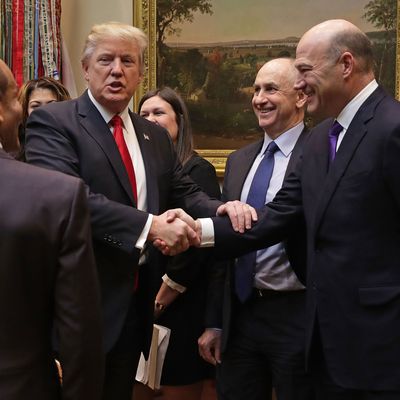
One of the revelations that came out in the wake of the financial crisis is that financial firms were dumping on their customers investments they knew to be bad. Among the many changes in the Dodd-Frank law is a “fiduciary rule,” requiring firms to provide investment advice that is in the best interest of their customers.
Donald Trump has filled his administration with Wall Street veterans, who believe that their industry is overregulated. (Financial firms accounted for 30 percent of all corporate profits before the economic crisis, but only 17 percent now, thanks largely to Dodd-Frank’s tighter regulation.) “Americans are going to have better choices and Americans are going to have better products because we’re not going to burden the banks with literally hundreds of billions of dollars of regulatory costs every year,” National Economic Council Director and Goldman Sachs veteran Gary Cohn tells The Wall Street Journal.
Cohn is planning to weaken the fiduciary rule, which he believes robs Americans of their freedom to hire financial advisers who might want to rip them off. “This is like putting only healthy food on the menu,” he tells the Journal, “because unhealthy food tastes good but you still shouldn’t eat it because you might die younger.”
Cohn’s metaphor is worth exploring. Healthy food, in Cohn’s example, is equivalent of investment advice that’s good for the client. Unhealthy food is like investment advice that’s bad for the client (but good for the adviser he has hired). Why shouldn’t people choose how much healthy versus unhealthy financial advice to hire? Well, the reason financial advisers are required to follow their clients’ fiduciary interests, rather than assuming that the logic of the free market will naturally produce optimal scrupulousness, is that investing is extremely complex. There is a huge asymmetry of information between professionals who work at investment firms and their customers. A customer at a restaurant might be able to eyeball the menu and guess that the spinach salad is healthier than the pizza, but a customer shopping for financial advisers is not going to know which ones will give them the best financial advice versus the ones who might might be trying to enrich themselves at the customer’s expense.
Cohn promises his plans to gut the fiduciary rule are just the beginning of Trump’s offensive against Dodd-Frank. “This is a table setter for a bunch of stuff that is coming,” he promises the Journal. The items he’s setting out on that table will probably be healthier for Goldman Sachs than for the country.






























